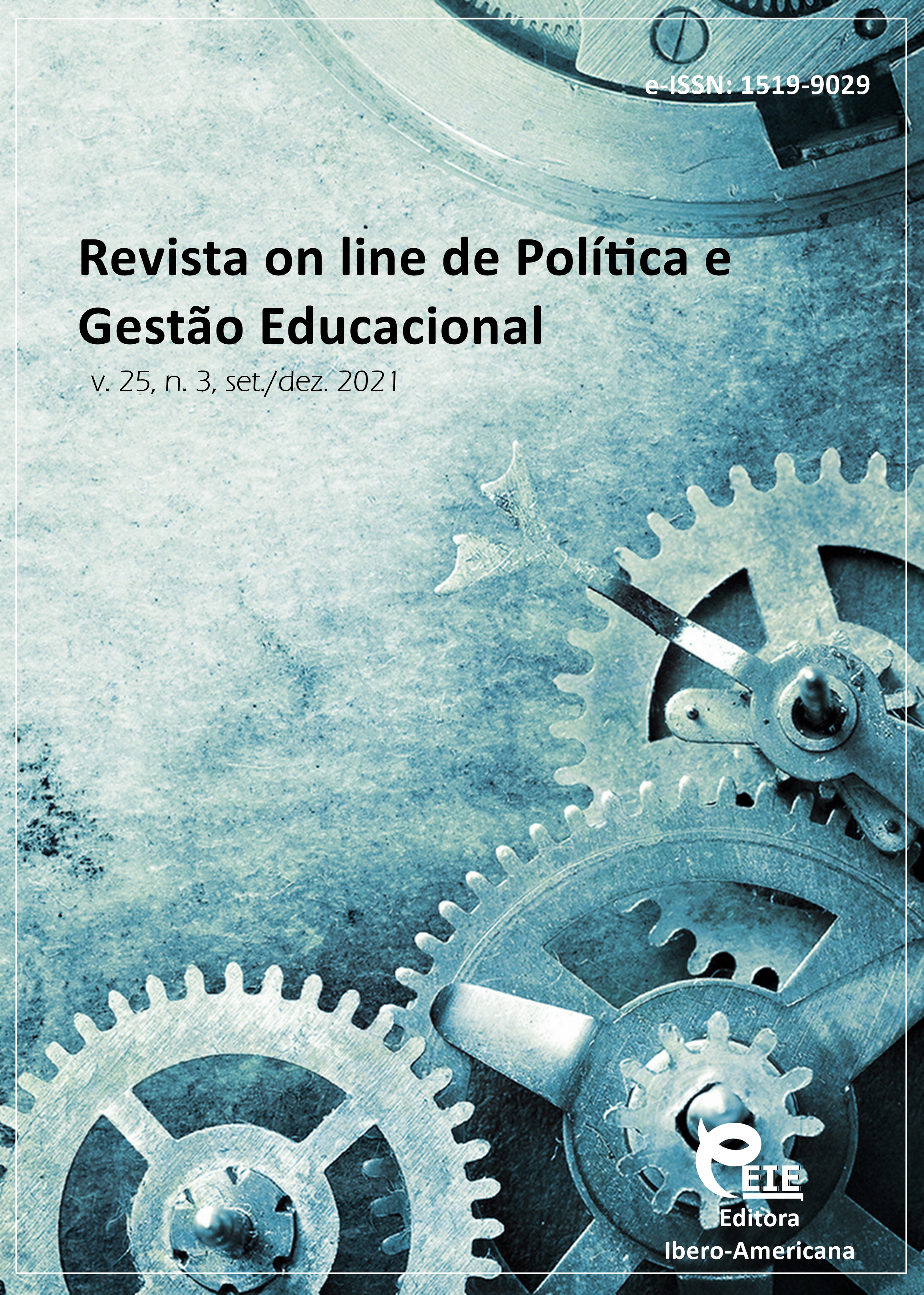On the development of cognitive skills and behavior regulation of five- and six-year-old children
DOI:
https://doi.org/10.22633/rpge.v25i3.15926Keywords:
Non-verbal intelligence, Working memory, Inhibitory controlAbstract
The article analyzes the development of cognitive skills and behavior regulation in five- and six-year-old children. The authors outlined the specifics of the development of cognitive skills and behavior regulation of preschoolers. In Block 1, the authors measured the level of intellectual development. Block 2 included diagnostics of cognitive skills development. In Block 3, the authors evaluated children’s understanding of emotions and their own and other people’s thoughts and feelings using the diagnostic methods developed for preschool children and adapted by A.N. Veraksa, D.A. Bukhalenkova, and O.V. Almazova. The authors widely used the NEPSY-II neuropsychological diagnostic complex’s subtests to assess the mental development of children aged 3 to 16. The authors devised the norms for developing cognitive skills and behavior regulation adapted for a particular Russian region. The obtained results of the study can be used as the basis for planning correctional and developmental activities with preschool children.
Downloads
References
AARON, P. G. et al. Diagnosis and treatment of reading disabilities based on the component model of reading: An alternative to the discrepancy model of LD. Journal of Learning Disabilities, Dallas, v. 41, n. 1, p. 67-84, 2008. DOI: https://doi.org/10.1177/0022219407310838
ALMAZOVA, O. V.; BUKHALENKOVA, D. A.; VERAKSA, A. N. The voluntariness in the preschool age: A comparative analysis of various approaches and diagnostic tools. National Psychological Journal, Moscow, v. 4, n. 24, p. 14-22, 2016. DOI: https://doi.org/10.11621/npj.2016.0402
ALMAZOVA, O. V.; BUKHALENKOVA, D. A.; VERAKSA, A. N. Diagnostika urovnya razvitiya regulyatornykh funktsiy v starshem doshkol'nom vozraste [Assessment of the Level of Development of Executive Functions in the Senior Preschool Age]. Psihologija. Žurnal Vysšej školy èkonomiki [Psychology. Journal of the Higher School of Economics], Moscow, v. 16, n. 2, p. 94-109, 2019. Available: https://psy-journal.hse.ru/en/2019-16-2/292253790.html. Access: 9 Dec. 2021.
ANDERSON, P. Assessment and Development of Executive Function (EF) During Childhood. Child Neuropsychology, Calgary, v. 8, n. 2, p. 71-82, 2002. DOI: https://doi.org/10.1076/chin.8.2.71.8724
BLAIR, C.; RAZZA, R. P. Relating Effortful Control, Executive Function, and False Belief Understanding to Emerging Math and Literacy Ability in Kindergarten. Child Development, Minneapolis, v. 78, n. 2, p. 647-663, 2007. DOI: https://doi.org/10.1111/j.1467-8624.2007.01019.x
CUTTING, L. E. et al. Effects of fluency, oral language, and executive function on reading comprehension performance. Annals of Dyslexia, Toronto, v. 59, n. 1, p. 34-54, 2009. DOI: https://doi.org/10.1007/s11881-009-0022-0
DEDYUKINA, M. I.; IVANOVA, M. K. Diagnostičeskij instrumentarij izučenija kognitivnoj i èmocionalʹnoj sfer razvitija detej 5-6 let [Diagnostic tools for studying the cognitive and emotional spheres of the development in five and six-year-olds]. Problemy sovremennogo pedagogičeskogo obrazovanija [Problems of Modern Pedagogical Education], n. 67-1, p. 295-298, 2020.
DRUZHININ, V. N. Kognitivnye sposobnosti: Struktura, Diagnostika, Razvitie [Cognitive Abilities: Structure, Diagnostics, Development]. Moscow: Per Sè [PerSe], 2001.
FELDSTEIN, D. I. Glubinnye izmenenija sovremennogo detstva i obuslovlennaja imi aktualizacija psihologo-pedagogičeskih problem razvitija obrazovanija [Deep changes in modern childhood and the resulting actualization of psychological and pedagogical problems of education development]. Vestnik praktičeskoj psihologii obrazovanija [Bulletin of Practical Psychology of Education], Moscow, v. 8, n. 4, p. 3-12, 2011. Available: https://psyjournals.ru/vestnik_psyobr/2011/n4/56243.shtml. Access: 9 Dec. 2021.
FRYE, D.; ZELAZO, P. D.; PALFAI, T. Theory of mind and rule-based reasoning. Cognitive Development, Greensboro, v. 10, n. 4, p. 483-527, 1995. DOI: https://doi.org/10.1016/0885-2014(95)90024-1
GARDNER, H. E. Intelligence reframed: Multiple intelligences for the 21st century. Hachette, UK, 2000.
HONEYWILL, R. The man problem: Destructive masculinity in western culture. New York: Palgrave Macmillan, 2015.
KELLY, G. The рsychology of рersonal сonstructs. New York: Norton, 1955.
KLOO, D.; PERNER, J. Training Transfer Between Card Sorting and False Belief Understanding: Helping Children Apply Conflicting Descriptions. Child Development, Minneapolis, v. 74, n. 6, p. 1823-1839, 2003. DOI: https://doi.org/10.1046/j.1467-8624.2003.00640.x
MASLENNIKOV, V. A. Development of intellectual abilities of younger schoolchildren. Veliky Novgorod: Novgorod State University, 2004.
MIYAKE, A. et al. The Unity and Diversity of Executive Functions and Their Contributions to Complex “Frontal Lobe” Tasks: A Latent Variable Analysis. Cognitive Psychology, Amherst, v. 41, n. 1, p. 49-100, 2000. DOI: https://doi.org/10.1006/cogp.1999.0734
OZEROV, V. P.; SOLOVYEVA, O. V. Diagnostika i formirovanie poznavatelʹnyh sposobnostej: Učebnoe posobie [Diagnostics and the formation of students’ cognitive abilities: A textbook]. Stavropol: Stavropol-Servis-Shkola, 1999.
PIAGET, J. Rech i myshlenie rebenka. Moscow: Rimis, 2008. Original title: The language and thought of the child.
PULKKINEN, L. Female and male personality styles: a typological and developmental analysis. Journal of Personality and Social Psychology, Washington, v. 70, n. 6, p. 1288-1306, 1996. DOI: https://doi.org/10.1037/0022-3514.70.6.1288
RUBINSTEIN, S. L. Osnovy obŝej psihologii [Fundamentals of general psychology]. St. Petersburg: Piter, 2002.
SNOW, K. L. Measuring school readiness: Conceptual and practical considerations. Early Education and Development, London, v. 17, n. 1, p. 7-41, 2006. DOI: https://doi.org/10.1207/s15566935eed1701_2
SYRNIKOVA, N. A. [On the comprehensive interpretation of intelligence]. In: SYRNIKOVA, N. A. [Memoirs of Novgorod State University: Collection of articles]. Veliky Novgorod: Novgorod State University, 1999. In Russian.
WIMMER, H.; PERNER, J. Beliefs about beliefs: Representation and constraining function of wrong beliefs in young children's understanding of deception. Cognition, Davis, v. 13, n. 1, p. 103-128, 1983. DOI: https://doi.org/10.1016/0010-0277(83)90004-5
Published
How to Cite
Issue
Section
License
Copyright (c) 2021 Revista on line de Política e Gestão Educacional

This work is licensed under a Creative Commons Attribution-NonCommercial-ShareAlike 4.0 International License.
Manuscritos aceitos e publicados são de propriedade da Revista on line de Política e Gestão Educacional. É vedada a submissão integral ou parcial do manuscrito a qualquer outro periódico. A responsabilidade do conteúdo dos artigos é exclusiva dos autores. É vedada a tradução para outro idioma sem a autorização escrita do Editor ouvida a Comissão Editorial Científica.











